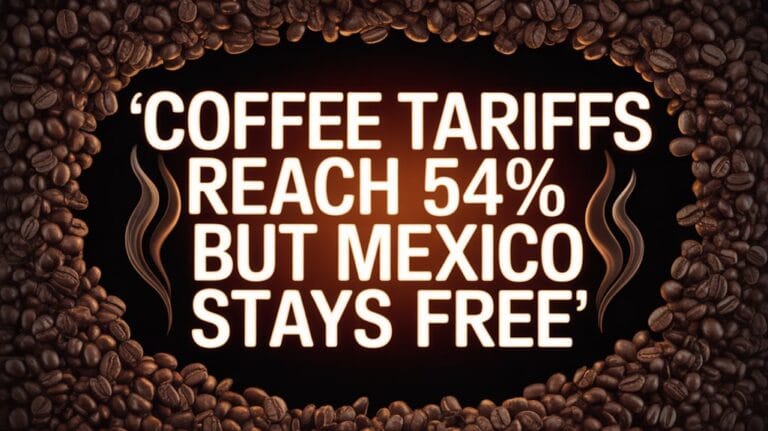How much more will Americans pay for their daily cup of coffee? The tariff implications of America’s new trade policies are creating major changes in the coffee supply, but the impact might be less severe than expected for most coffee drinkers.
New trade tariffs are reshaping America’s coffee market, though consumer impact may be surprisingly manageable.
Starting April 5, 2025, the United States implemented a baseline 10% tariff on most imported coffee. By August 1, some countries faced much steeper rates. Indonesia now pays 32% tariffs, while Vietnam faces 20%. China‘s coffee exports deal with combined tariffs reaching 54%, though China isn’t a major coffee supplier to America.
Vietnam, the world’s second-largest coffee producer, exports mostly robusta beans and now confronts tariffs up to 46%. Indonesia, known for specialty coffee, sees its 32% tariff affecting premium coffee markets.
Brazil, America’s largest coffee supplier, faces the relatively modest 10% baseline rate but still deals with existing supply shortages. The situation is complicated by previous droughts that have critically affected Brazilian coffee supplies and reduced availability in the U.S. market.
These tariff increases come at a challenging time. Coffee prices already hit record highs in early 2025, with arabica trading above $4 per pound due to supply shortages. The new tariffs will likely push prices higher and reduce availability in American stores.
However, one major exception provides relief. Mexico’s green, unroasted coffee qualifies as “USMCA-compliant” and remains exempt from tariffs. This exemption preserves important trade advantages and helps maintain some price stability for American consumers.
The 2025 tariffs raised America’s general effective tariff rate to 22.5%, the highest since 1909. These changes affect many products beyond coffee, increasing the U.S. price level by 1.3% from April’s actions alone.
Combined 2025 tariffs result in a 2.3% price increase across the economy. The National Coffee Association warns that tariffs threaten relationships with coffee producers and could greatly increase consumer costs. They’ve requested exemptions for coffee imports.
Specialty and robusta coffees from high-tariff countries risk becoming more expensive or scarce. Coffee businesses are developing backup sourcing strategies to maintain supply flexibility. Tariffs function as a tax on businesses rather than foreign producers, meaning U.S. companies absorb the increased costs directly.
While tariffs will affect coffee prices, the Mexican exemption and Brazil‘s lower rate help cushion the blow for American coffee lovers.





